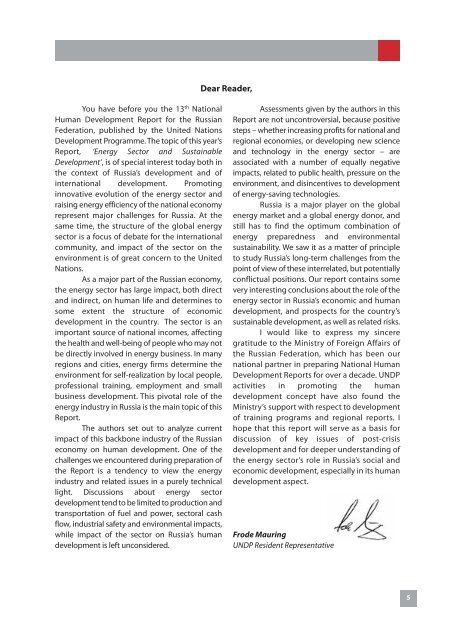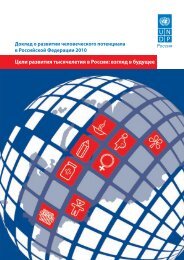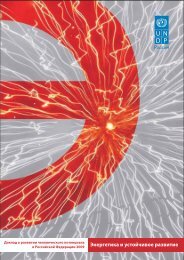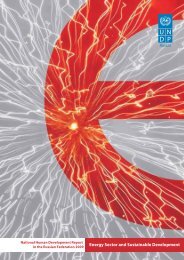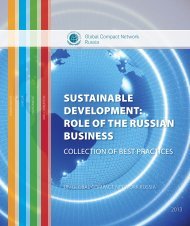Report - UNDP Russia
Report - UNDP Russia
Report - UNDP Russia
Create successful ePaper yourself
Turn your PDF publications into a flip-book with our unique Google optimized e-Paper software.
Dear Reader,You have before you the 13 th NationalHuman Development <strong>Report</strong> for the <strong>Russia</strong>nFederation, published by the United NationsDevelopment Programme. The topic of this year’s<strong>Report</strong>, ‘Energy Sector and SustainableDevelopment’, is of special interest today both inthe context of <strong>Russia</strong>’s development and ofinternational development. Promotinginnovative evolution of the energy sector andraising energy efficiency of the national economyrepresent major challenges for <strong>Russia</strong>. At thesame time, the structure of the global energysector is a focus of debate for the internationalcommunity, and impact of the sector on theenvironment is of great concern to the UnitedNations.As a major part of the <strong>Russia</strong>n economy,the energy sector has large impact, both directand indirect, on human life and determines tosome extent the structure of economicdevelopment in the country. The sector is animportant source of national incomes, affectingthe health and well-being of people who may notbe directly involved in energy business. In manyregions and cities, energy firms determine theenvironment for self-realization by local people,professional training, employment and smallbusiness development. This pivotal role of theenergy industry in <strong>Russia</strong> is the main topic of this<strong>Report</strong>.The authors set out to analyze currentimpact of this backbone industry of the <strong>Russia</strong>neconomy on human development. One of thechallenges we encountered during preparation ofthe <strong>Report</strong> is a tendency to view the energyindustry and related issues in a purely technicallight. Discussions about energy sectordevelopment tend to be limited to production andtransportation of fuel and power, sectoral cashflow, industrial safety and environmental impacts,while impact of the sector on <strong>Russia</strong>’s humandevelopment is left unconsidered.Assessments given by the authors in this<strong>Report</strong> are not uncontroversial, because positivesteps – whether increasing profits for national andregional economies, or developing new scienceand technology in the energy sector – areassociated with a number of equally negativeimpacts, related to public health, pressure on theenvironment, and disincentives to developmentof energy-saving technologies.<strong>Russia</strong> is a major player on the globalenergy market and a global energy donor, andstill has to find the optimum combination ofenergy preparedness and environmentalsustainability. We saw it as a matter of principleto study <strong>Russia</strong>’s long-term challenges from thepoint of view of these interrelated, but potentiallyconflictual positions. Our report contains somevery interesting conclusions about the role of theenergy sector in <strong>Russia</strong>’s economic and humandevelopment, and prospects for the country’ssustainable development, as well as related risks.I would like to express my sinceregratitude to the Ministry of Foreign Affairs ofthe <strong>Russia</strong>n Federation, which has been ournational partner in preparing National HumanDevelopment <strong>Report</strong>s for over a decade. <strong>UNDP</strong>activities in promoting the humandevelopment concept have also found theMinistry’s support with respect to developmentof training programs and regional reports. Ihope that this report will serve as a basis fordiscussion of key issues of post-crisisdevelopment and for deeper understanding ofthe energy sector’s role in <strong>Russia</strong>’s social andeconomic development, especially in its humandevelopment aspect.Frode Mauring<strong>UNDP</strong> Resident Representative5


